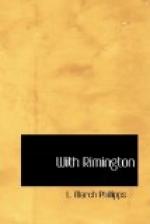intermissions all day, and even in the evening, though
parts of the Boer position had been captured and many
of them had fled, there were some who still made good
their defence, holding out in places of vantage with
the greatest obstinacy. These took advantage
of the night to escape, and it was not till next morning
that we had the place in our possession. The Boers
themselves, as we are told by people here, thought
the position impregnable. Certainly it was very
strong. The river has cut a channel or groove
thirty feet deep in the ground; the edges, sharp and
distinct, so that men can lie on the slant and look
out across the plain. A big loop in the river
is subtended by a line of trenches and rifle-pits
hastily dug (they only decided twenty-four hours before
the attack to defend the position; this by Cronje’s
advice, who had just come south from Mafeking, the
others were for retiring to the next range of hills),
from which the whole advance of our infantry across
the level is commanded. “We,” as
the soldiers explained to me, “could see nothing
in our front but a lot of little heads popping up
to fire and then popping down again.” These
shelters, a long line of them, are littered thick
with empty cartridge cases, hundreds in each; one thinks
involuntarily of grouse-driving. Bodies, still
unburied, lay about when I was there. Such odours!
such sights! The unimaginable things that the
force of shot and shell can do to poor, soft, human
flesh. I saw soldiers who had helped to do the
work turn from those trenches shaking.
LETTER V
THE FOUR POINT SEVEN
MODDER RIVER CAMP,
December 1899.
A few days ago we welcomed a distinguished stranger
here in the shape of a long 4.7 naval gun. They
set him up in the road just outside the station, with
his flat-hatted sailors in zealous attendance, where
he held a day-long levee. The gun is a remarkable
object among the rest of our artillery. Its barrel,
immensely long but very slender, has a well-bred,
aristocratic look compared with the thick noses of
our field-guns. It drives its forty-five pound
shell about seven miles, and shoots, I am told, with
perfect accuracy. It is an enlarged edition of
the beautiful little twelve-pounders which we have
hitherto been using, and which exceed the range of
our fifteen-pounder field-guns by about a half.
Why should naval guns be so vastly superior to land
ones?
I interviewed the sailors on the accomplishments of
the new-comer, and on the effects especially of lyddite,
about which we hear so much. One must allow for
a little friendly exaggeration, but if the mixture
of truth is in any decent proportion, I should say
that spades to bury dead Boers with are all the weapons
that the rest of us will require in future. The
gun uses shrapnel as well, but relies for its main
effects on lyddite. As for this horrible contrivance,




